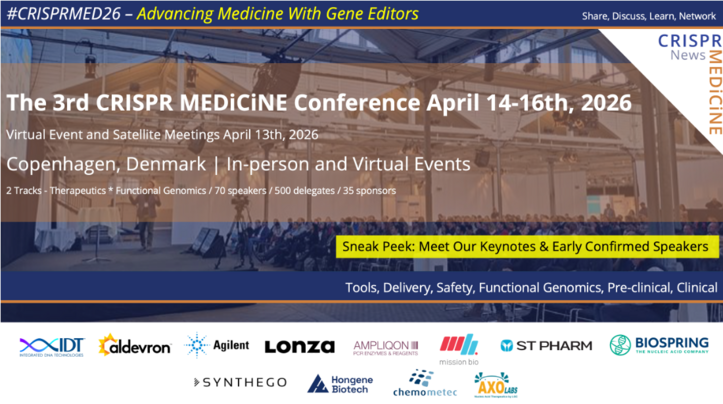CRISPR Clinical Trial Roundup: Rare Diseases
Gene-editing technologies are progressing fast, and there are now more than 100 ongoing trials for new therapies and diagnostics based on CRISPR-Cas, zinc finger nucleases, TALENS, and base editors.
While most of these trials are evaluating ex vivo gene-edited cell-based therapies for cancers and genetic blood disorders, e.g., beta thalassemia and sickle cell disease, a handful of the ongoing studies are evaluating in vivo CRISPR-based therapies for rare genetic diseases. In this piece, we round up what’s happening within CRISPR therapies for rare diseases.
The first ever in vivo CRISPR therapy holds promise for hereditary transthyretin amyloidosis
In summer 2021, Intellia Therapeutics and Regeneron shared landmark clinical data that supports the safety and efficacy of in vivo CRISPR genome editing in humans. This annoucement related to their Phase 1 trial for NTLA-2001, a single-dose CRISPR-Cas9 therapy candidate for hereditary transthyretin (TTR) amyloidosis with polyneuropathy (ATTRv-PN).
ATTR is a rare, progressive disease, in which a protein known as TTR becomes misfolded and accumulates as plaques in tissues throughout the body. This causes serious complications that mainly involve the heart and nerves, and most patients die 2-15 years after disease onset. ATTR occurs in a heritable form (ATTRv) and an acquired form (ATTRwt) that may occur with elevated age (ATTRwt). The exact prevalance of ATTR is unknown but ATTRv amyloidosis is estimated to affect 50,000 people worldwide.
NTLA-2001 is jointly developed by Intellia Therapeutics and Regeneron and was the first CRISPR therapy to be injected directly into humans via the bloodstream. It is designed to treat ATTR by selectively reducing the levels of mutated TTR protein in the blood, through CRISPR-based inactivation of the TTR gene in liver cells.
So far, clinical data has been disclosed for the first six patients treated from cohorts in New Zealand and the UK. These patients were treated by a single intravenous injection of either of two doses of NTLA-2001, which led to reductions in the level of TTR protein in the range of 52 % - 87 %, compared to baseline TTR measurements in all cases. No major safety concerns had presented as of Day 28 post-treatment. The companies disclosed in a press release at that time that enrolment was ongoing for a third cohort, who would receive a higher dose. The study is expected to be complete in 2024.
The U.S. FDA granted Orphan Drug Designation for NTLA-2001 for ATTR in October 2021, and Intellia Therapeutics since announced expansion of the Phase 1 trial to include adults with inherited transthyretin amyloidosis with cardiomyopathy (ATTRv-CM).
Early but encouraging data for EDIT-101 in hereditary blindness
In September 2021, Editas Medicine shared positive initial clinical data from its ongoing Phase 1/2 BRILLIANCE trial for Leber congenital amaurosis 10 (LCA10), a rare incurable hereditary eye disease that causes blindness by the 3rd or 4th decade of life.
EDIT-101 is a CRISR-Cas9-based gene-editing candidate designed to correct LCA10-mutations in the CEP290 gene, which together account for almost one third of all LCA cases. While CEP290 mutations disable light-detecting cells in the retina, the retinal cells themselves are still present and viable in LCA10, raising hopes that EDIT-101 can improve vision in this patient group.
So far, Editas has revealed that patients treated with EDIT-101 have not experienced serious adverse events or dose-limiting toxicities, and modest signs of visual improvements have been reported for the mid-dose cohort. At the time of the announcement, the company was continuing to treat a high-dose adult cohort and would begin dosing children with LCA10.
Although EDIT-101 is still at early clinical stage, signs of efficacy and safety provide new hopes for LCA sufferers, for whom current treatment options are poor and often only available to a subset of patients with the ‘right’ mutations (you can read more about LCA in our earlier disease roundup).
First patient dosed in CRISPR trial for hereditary angioedema
Hereditary angioedema (HAE) is a rare and painful disease characterised by severe inflammatory attacks with swelling in various organs and tissues. In October, Intellia Therapeutics announced that its CRISPR-based therapy for HAE, NTLA-2002, had been approved for clinical trial inititon in New Zealand.
Plasma kallikrein is a protein that is known to drive multiple inflammatory pathways including the inflammatory processes seen in HAE. NTLA-2002 is an in vivo CRISPR-Cas9 gene-editing therapy candidate that is designed to disrupt the target gene kallikrein B1 (KLKB1) in hepatocytes. This gene encodes prekallikrein, a precursor of plasma kallikrein, thus its knockout is expected to permanently reduce plasma kallikrein activity and halt the production of bradykinin to prevent HAE attacks. You can read more about how NTLA-2002 works in an earlier article here.
NTLA-2002 is delivered as a Cas9 mRNA and gRNA via lipid nanoparticles, and pre-clinical studies demonstrated sustained and therapeutically relevant reduction in plasma kallikrein activity following a single dose in non-human primates.
In the Phase 1/2 trial, NTLA-2002 is injected directly into the body and is designed to knock out the target gene kallikrein B1 (KLKB1) in liver cells, which is expected to permanently reduce plasma kallikrein activity and halt the inflammation seen in HAE. This is the first ever gene-editing candidate for HAE to enter a clinical study, and the first patient was dosed in December 2021. The expected study completion date is December 2025.
We strive to bring you all the clinical updates for gene-edited therapies. For a complete overview of current gene-editing clinical therapeutic trials as well as diagnostic trials, check out CRISPR Medicine News' Clinical Trials Database.
To get more of the CRISPR Medicine News delivered to your inbox, sign up to the free weekly CMN Newsletter here.
Tags
ArticleNewsIn vivoin vivoHereditary angioedema, HAELeber Congenital AmaurosisTransthyretin amyloidosis, ATTRTransthyretin Cardiac Amyloidosis, TTRRare DiseaseCRISPR-CasCas9Editas Medicine, Inc.Intellia Therapeutics, Inc.Regeneron Pharmaceuticals, Inc.
CLINICAL TRIALS
Sponsors:
Suzhou Maximum Bio-tech Co., Ltd.
Sponsors:
Zhejiang University







